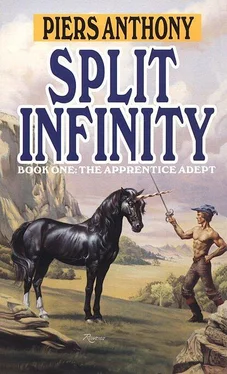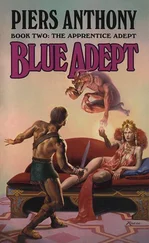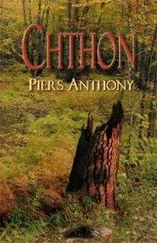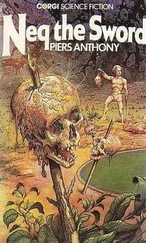Piers Anthony - Split Infinity
Здесь есть возможность читать онлайн «Piers Anthony - Split Infinity» весь текст электронной книги совершенно бесплатно (целиком полную версию без сокращений). В некоторых случаях можно слушать аудио, скачать через торрент в формате fb2 и присутствует краткое содержание. Год выпуска: 2011, Жанр: Фэнтези, на английском языке. Описание произведения, (предисловие) а так же отзывы посетителей доступны на портале библиотеки ЛибКат.
- Название:Split Infinity
- Автор:
- Жанр:
- Год:2011
- ISBN:нет данных
- Рейтинг книги:5 / 5. Голосов: 1
-
Избранное:Добавить в избранное
- Отзывы:
-
Ваша оценка:
- 100
- 1
- 2
- 3
- 4
- 5
Split Infinity: краткое содержание, описание и аннотация
Предлагаем к чтению аннотацию, описание, краткое содержание или предисловие (зависит от того, что написал сам автор книги «Split Infinity»). Если вы не нашли необходимую информацию о книге — напишите в комментариях, мы постараемся отыскать её.
Split Infinity — читать онлайн бесплатно полную книгу (весь текст) целиком
Ниже представлен текст книги, разбитый по страницам. Система сохранения места последней прочитанной страницы, позволяет с удобством читать онлайн бесплатно книгу «Split Infinity», без необходимости каждый раз заново искать на чём Вы остановились. Поставьте закладку, и сможете в любой момент перейти на страницу, на которой закончили чтение.
Интервал:
Закладка:
It was a good break for him, for Stile was an offensive player whose serve was integral to his strategy. He needed to take and keep the initiative, to make up for his lack of reach. He would not be able to win points directly from his serve, against a player of Hair’s caliber, but he could certainly put the man safely on the defensive. That was the way Stile liked it. It gave him necessary options. Of course the serve would change every five points—but once he had the lead, he could ride through to victory without pushing himself. Considering his present liabilities, that was important.
Stile served, a cross-court top-spin ball, fast and low over the net, striking neatly two centimeters from the back edge of the table. Hair returned it cautiously with an undercut to the center of Stile’s court. The game was on.
Stile backhanded the ball with a flick of the wrist, to Hair’s forehand court. Move it about, keep the other player reaching! Never let the opponent get set for his own strategy. Hair returned it to Stile’s forehand, some-what high and shaky, with almost no spin. Good—he was nervous! That diminished Stile’s own tension. This was going his way. Stile made a forehand slam and took the point.
Stile served again the moment he had the ball, back-hand crosscourt with an undercut. Hair flubbed it again. The score was 2-0. Hair was more visibly nervous now. Excellent. The psychology of nervousness was important in any competition.
But Hair’s next return, played too low, nevertheless dribbled over the net, unreturnable. 2-1. These lucky shots occurred; it was usually of no significance. Only when the luck played obvious favorites, as sometimes happened despite the assurances of the experts on probability, was it a critical factor. Stile fired in a side-spin, and Hair sent it wide of the table. 3-1.
The next volley went longer, but Stile finally put it away with a good cross-court slam. 4-1. This game was not going to be a problem.
Now it was Hair’s serve. He uncorked a weak drop-shot that barely cleared the end of the table; Stile, expecting a harder shot, almost muffed it. But his return was a setup, and Hair put it away for the point. 2-^4. In Ping-Pong the server’s score was always listed first.
There was something funny about Hair’s style, and in moments he took two more points. Stile bore down, overreached himself, and lost another. Now he was behind. Carelessness!
But the run continued. Stile suddenly seemed unable to do right. In moments he was behind 4-10, having lost nine points in a row, his own serve no longer helping him.
What was wrong? He had started well, then lost it. Had fatigue undercut him more than he realized, interfering with his precision? Stile didn’t think so. He was playing well enough to win—except that he was losing. Why?
He served a dropshot that barely cleared the table. Hair returned it too softly; it was a setup shot that Stile swiftly put away. 5-10. Strange that the return had been so soft; Hair knew better.
Then Stile caught on. Hair was using a random-variable surface paddle! This was legal, as standards for table-tennis bats had never been instituted; but also tricky, for precision placement was difficult. The variations of bounce were not great, which was why it had not been obvious, but Stile should have noticed it before. That was how his fatigue let him down; he had not been alert to the unexpected.
In an instant Stile knew what he had to do. The variable-surface returns forced Hair to play conservatively, keeping his shots well within the margin of safety, though that sometimes set shots up for Stile. But Hair was aware of that. Stile, unaware, had been playing aggressively—and so those slightly changed returns had fouled him up more than his opponent. The more points he lost, the more aggressively he had played, aggravating the situation. A difference in ball velocity and travel so small as to be imperceptible to an on-looker could play havoc with a style like Stile’s.
He couldn’t handle it. Hair was good enough so that the paddle gave him the edge. Had Stile caught on early he could have played more conservatively himself, holding his lead, forcing Hair to make more aggressive shots that were increasingly risky. But with a 5-10 deficit that strategy wouldn’t work; Stile was the one who had to get aggressive. And lose.
He had been suckered, just as he had in the marathon detour. His opponent had outplayed him, off the grid. Stile was in deep trouble again.
So—he had to change his game. He had to go all the way defensive. He needed to allow time and distance to analyze each return individually. This wasn’t his normal game, but he had no choice now.
He tried. He had not played a lot of Ping-Pong recently—how could he, with all that had been going on in two worlds!—and had kept in shape only in his natural game. Offense. Spins, placements, slams, changes-of-pace—all fouled up by the marginal uncertainty of the variable-surface paddle. Now, thrown back on a long-neglected resource, he seemed to be in worse trouble yet. He lost a point, and another. 12-5. Soon the gap would be too large to close; sheer chance would give a few points to Hair in the end.
But Stile worked at it, making his shots high and central and safe. This set him up neatly for Hair, who quickly adapted to the situation and started getting more aggressive. Hair had more leeway now; he could afford to indulge a normally weak offense. Stile was only digging himself in deeper.
Yet he had to do it. He extended himself, despite twinges from his rib cage, adapting to this mode. He could judge the shots better now, for he was playing far back, and he was getting the feel of it. He did know how to do it; he had only to remember, to dredge up long-unused reflexes. He fought the next point, covering all Hair’s maneuvers, and won it. And lost the next. He still had not quite worked it out—and he needed to, because the point of no return was coming close.
The audience was hushed by this remarkable turn of the game. Now an announcer could be heard from the supposedly soundproofed telebooth. “. . . strangest Ping-Pong game of the season ... Stile, the favorite, far behind and playing as if he wants to lose it worse yet . . . will be an inquest to determine whether some-one has been paid off ...”
As if he didn’t have enough of a problem already! They thought he was throwing this game! That some other Citizen had proffered him lucrative employment if he missed the Tourney this year. Fortunately the computer analysis of the recording would refute that; all Stile’s lost points were honest ones. But if he lost, what difference would it make whether it were honest or dishonest? He would still be finished. In this world, anyway.
But that was not the way he wanted to depart Proton. He had to recover this game!
Stile played the next serve carefully, extending the volley. He needed practice at this defensive game, and the longer the volleys continued the more practice he would get. He won the point, bringing up the change of service at 13-7.
His turn to serve—but if he used it to take the offense, he would lose. He had to give up his normal advantage, for the sake of his strategy, not breaking his continuity.
He served gently—and heard the response of the audience. Most of the watchers did not know why he had been missing points, and thought he was being driven to defense by the strength of Hair’s offense. They thought he was foolish to throw away his principal weapon. The serve had always been his tool for the initiative. Some spectators were already leaving, satisfied that Stile had lost.
Hair was glad to continue the offense. He had nothing to gain by indulging in prolonged volleys. Now that Stile had neutralized the paddle-weapon, longer volleys would only give Hair more chances to make mistakes. He needed to put away his points quickly, before Stile got his defensive game in full shape, even if he lost two points for one.
Читать дальшеИнтервал:
Закладка:
Похожие книги на «Split Infinity»
Представляем Вашему вниманию похожие книги на «Split Infinity» списком для выбора. Мы отобрали схожую по названию и смыслу литературу в надежде предоставить читателям больше вариантов отыскать новые, интересные, ещё непрочитанные произведения.
Обсуждение, отзывы о книге «Split Infinity» и просто собственные мнения читателей. Оставьте ваши комментарии, напишите, что Вы думаете о произведении, его смысле или главных героях. Укажите что конкретно понравилось, а что нет, и почему Вы так считаете.










